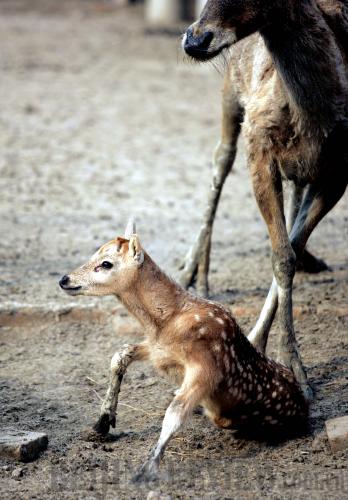|
 |
|
NEW LIFE: The first Pere David's deer that was created from artificial insemination was born in Beijing on April 16, 2008 (XINHUA) |
As the first Chinese winner of the Whitley Award, the top-level nature reserve prize offered by the Britain-based Whitley Fund for Nature, Jiang participated twice in the experiment of acclimating Pere David's deer to natural environments.
"The success offered valuable pointers about other rare species—for them, domestication in a zoo behind iron gates is not the best way to save them from extinction. The essential solution is letting them survive and develop in nature," Jiang said.
In an ecosystem, certain species play significant roles due to their size or number. Some of them can even decide the fate of an ecosystem, for instance, the Tibetan antelope in Hoh Xil. The Pere David's deer play a similar dominant role in the Dafeng nature reserve. Protecting the deer has enabled many other species to revive and the whole ecosystem has become more complex, better established and more capable of withstanding interference.
The nature reserve in Dafeng is not the only place in China where Pere David's deer can develop in a natural environment. The Shishou Milu Nature Reserve in Hubei Province also had a similar experience. In 1998 when the Yangtze River was flooding, domesticated Pere David's deer were washed away to the Eastern Dongting Lake area. In the next 10 years, they migrated, reproduced in a natural environment and reverted to their original state.
In September 2008, the Luanhe National Nature Reserve in Hebei Province cooperated with Beijing Nanhaizi Milu Park to return 10 deer to their original site—Mulan Meadow. In June this year, six deer were returned to nature tagged by a satellite positioning cellphone transmission tracking system, so as to enable the transmission of up to date information about them to researchers.
Going home
China has the greatest number of species of the deer family, more than half of the total in the world. Pere David's deer is the scarcest of them and had previously been facing a miserable fate. Nonetheless, in the past 1,000 years, because of excessive hunting and killing, Pere David's deer faced extinction several times. About 100 years ago, wild Pere David's deer had almost vanished in China. Fewer than 300 of them, which were domesticated in the Nanhaizi imperial hunting park in Beijing, were the only representatives of this species on the planet.
When the Eight-power Allied Forces invaded Beijing in 1900, most of the deer in the imperial park were slaughtered and the survivors were taken to different countries around the world. England's Duke of Bedford bought the last 18 in the world at high prices and gathered them at the Woburn Abbey Manor in northern London. Those 18 were the progenitors of the world's present entire Pere David's deer population. In 1985 and 1986, Britain returned 61 deer to China.
In the past 20 years, Pere David's deer from abroad have gradually become used to the environment of their ancestors in Nanhaizi. In the first three years, 10 deer were born and now the number has increased to several hundred.
In April last year the first Pere David's deer created from artificial insemination was born in Nanhaizi.
Scientists also looked for a suitable "new home" for the deer. They investigated the coastal region of east China where the Pere David's deer used to live. Eventually, they came across the bottom land of the Yellow Sea, in Dafeng, Jiangsu Province, wherein is the largest wetland of the west coast of the Pacific Ocean. In the more than 10,000-hectare wetland, various kinds of animals live in a semi-primeval environment. Pere David's deer's fossils have been unearthed there several times. In August 1986, the first and largest Pere David's deer reserve in the world was constructed there.
Researchers observe the deer 24 hours a day and record the behavior and living habits of each one. They even record their emotional states such as anger, sorrow, and joy. These deer brought back to their home area have restored their population quickly. | 